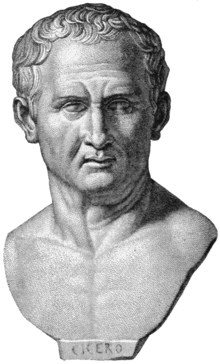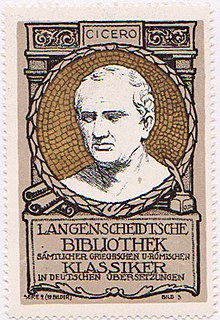Cicero
![]()
Cicero is a redirect to this article. For other meanings, see Cicero (disambiguation).
Marcus Tullius Cicero (pronunciation in German [ˈt͡sɪt͡seʁo], also [ˈt͡siːt͡seʁo], in classical Latin [ˈkɪkɛroː]; * 3 January 106 BC in Arpinum; † 7. December 43 BC at Formiae) was a Roman politician, lawyer, writer and philosopher, the most famous orator of Rome and consul in 63 BC.
Cicero was one of the most versatile minds of Roman antiquity. As a writer, he was already a stylistic model for the ancient world; his works were imitated as a model of a perfected, "golden" Latinity (Ciceronianism). His importance in the philosophical field lies primarily not in his independent insights, but in the transmission of Greek philosophical thought to the Latin-speaking world; often his Greek sources are only tangible in his editing, since they have survived nowhere else. For the suppression of Catilina's conspiracy and the resulting temporary rescue of the Republic, the Senate honored him with the title pater patriae (father of the fatherland).
His extensive correspondence, especially the letters to Atticus, had a decisive and lasting influence on European epistolary culture. These letters and the rest of his work provide us with a detailed picture of the conditions in Rome at the end of the Republic. During the civil wars and the dictatorship of Gaius Iulius Caesar, Cicero repeatedly advocated a return to the traditional republican constitutional form and exercise of rule. In his political practice he showed a flexibility that earned him accusations of opportunism and unprincipledness, the evaluation of which remains controversial among scholars. After Caesar's assassination in 44 BC, Cicero was placed on the proscription list by the triumvirs Antony, Octavianus, and Lepidus, and was killed in flight on December 7, 43 BC.

Cicero, engraving after antique inscribed portrait in Apsley House, London
_-_Palazzo_Nuovo_-_Musei_Capitolini_-_Rome_2016.jpg)
Portrait of Cicero, detail of the bust in the Capitoline Museums (Inv. 589)
Editions and translations
Total expenditure
- M. Tulli Ciceronis opera quae supersunt omnia. Lat. critical complete edition in single volumes versch. Ed. in different editions. Editions. B. G. Teubner, Leipzig and Stuttgart (Bibliotheca Teubneriana).
- Works. Lat.-engl. complete edition in single volumes, various ed. Ed. in various editions. editions. Loeb, London/Cambridge, Mass. (Loeb Classical Library).
Speeches
- M. Tulli Ciceronis Orationes, lat. critically ed. by A. C. Clark and W. Peterson. 6 vols., Oxford 1905-1918 u.ö. (Bibliotheca Oxoniensis).
- All speeches. Introduced, translated and edited by Manfred Fuhrmann. Artemis, Zurich 1971 ff.
- The political speeches, Latin-German ed., transl. and ed. by Manfred Fuhrmann. 3 vols. Artemis und Winkler, Munich 1993.
- The speeches against Verres, Latin-German ed., transl. and ed. by Manfred Fuhrmann. Artemis und Winkler, Munich 1995.
- The trial speeches, lat.-dt. ed., transl. and erl. by Manfred Fuhrmann. 2 vols. Artemis und Winkler, Munich 1997.
- Cicero, Agrarian Speeches. Introduction, Text, Translation, and Commentary by Gesine Manuwald. Oxford University Press, Oxford 2018.
Philosophical writings
- The State (De re publica), Latin-German ed. and transl. by Karl Büchner. 4th ed. Artemis und Winkler, Munich/Zurich 1987.
- Hortensius, Lucullus, Academici libri, lat.-dt. ed. and transl. by Laila Straume-Zimmermann, F. Broemser and Olof Gigon. Munich/Zurich: Artemis und Winkler 1990.
- On the Aims of Human Action (De finibus), Latin-German ed. and transl. by Olof Gigon. Artemis und Winkler, Munich/Zurich 1988.
- Conversations in Tusculum. Tusculanae disputationes. Ed. by Olof Gigon. 7th ed., Artemis und Winkler, Munich/Zurich 1998.
- Tusculanae disputationes. Ed.: Max Pohlenz, Bibliotheca Teubneriana, 1918.
- Vom Wesen der Götter (De natura deorum), Latin-German ed. and transl. by W. Gerlach and Karl Bayer. 3rd ed., Artemis und Winkler, Munich/Zurich 1990.
- On Fate (De fato), Latin-German ed. and transl. by Karl Bayer. 4th ed., Artemis und Winkler, Düsseldorf/Zurich 2000.
- Cato Maior. Laelius, lat.-dt. ed. and transl. by M. Faltner. Artemis und Winkler, Munich/Zurich 1988.
- Vom rechten Handeln (De officiis), Latin-German ed. and transl. by Karl Büchner. 3rd ed., Artemis und Winkler, Munich/Zurich 1987.
- De Officiis, lat. ed. by M. Winterbottom, Oxford Classical Texts, Oxford 1994.
- De finibus bonorum et malorum. lat. ed. by L. D. Reynolds, Oxford Classical Texts, Oxford 1998.
Rhetorical writings
- De oratore - On the Speaker, Latin-German ed. and transl. by H. Merklin. Reclam, Stuttgart 1978 u.ö.
- Brutus, lat.-dt. ed. and transl. by Bernhard Kytzler. 4th ed., Artemis und Winkler, Munich/Zurich 1990.
- Orator, Latin-German ed. and transl. by Bernhard Kytzler. 3rd ed., Artemis und Winkler, Munich/Zurich 1988.
- Rhetorica lat. ed. by A.S. Wilkins, 2nd vols, Oxford Classical Texts, Oxford 1963.
Letters
- Epistulae ad familiares, lat. ed. and annotated by D. R. Shackleton Bailey. 2 vols., Cambridge University Press, Cambridge 1977.
- Epistulae ad familiares. Libri I-XVI, lat. ed. by D. R. Shackleton Bailey. Teubner, Stuttgart 1988.
- An seine Freunde (Ad familiares), lat.-dt. ed. and transl. by Helmut Kasten. 4th ed., Artemis und Winkler, Munich/Zurich 1989.
- Letters to Atticus (Ad Atticum), lat.-engl. ed., transl. and annotated by D. R. Shackleton Bailey. 7 vols., Cambridge 1965-1970.
- Atticus-Briefe (Ad Atticum), lat.-dt. ed. and transl. by Helmut Kasten. 4th ed., Artemis und Winkler, Munich/Zurich 1990.
- Epistulae ad Quintum fratrem et M. Brutum, lat. ed. and annotated by D. R. Shackleton Bailey. Cambridge University Press, Cambridge 1980.
- An Bruder Quintus, An Brutus (Ad Quintum fratrem, Ad Brutum), lat.-dt. ed. and transl. by Helmut Kasten. Artemis und Winkler, Munich/Zurich 1965.
Anthologies
- Marion Giebel (ed.): Cicero zum Vergnügen. Reclam, Stuttgart 1997.
- Karl-Wilhelm Weeber (ed.): Cicero für Juristen. Insel, Frankfurt am Main 1999, ISBN 3-458-34242-7

Cicero on a collector's stamp of the Langenscheidt publishing house
Questions and Answers
Q: Who was Marcus Tullius Cicero?
A: Marcus Tullius Cicero was a Roman statesman, philosopher, lawyer, and political theorist who is considered one of Rome's greatest orators and prose stylists.
Q: What was the contribution of Cicero to the Latin language?
A: Cicero's Latin is considered the model of Classical Latin.
Q: What did Cicero introduce to the Romans?
A: Cicero introduced Greek philosophy to the Romans.
Q: How was Cicero involved in the politics of the Roman Republic?
A: Cicero was heavily involved in the politics of the Roman Republic.
Q: Who did Cicero become an enemy of after Julius Caesar's death?
A: After Julius Caesar's death, Cicero became an enemy of Mark Antony.
Q: What did Cicero do during the power struggle against Mark Antony?
A: During the power struggle against Mark Antony, Cicero attacked Antony in a series of speeches.
Q: How did Cicero's life end?
A: Cicero was proscribed as an enemy of the state by the Second Triumvirate and was executed in 43 BC by soldiers working for the Triumvirate.
Search within the encyclopedia